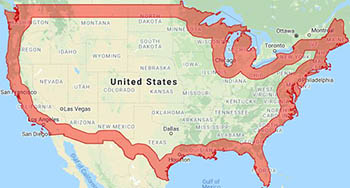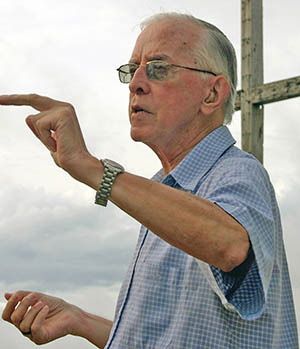|
|
|
|
The weekly newsletter of the México Solidarity Project |
|
|
|
October 28, 2020/ This week's issue/ Meizhu Lui, for the editorial team
What comes to mind when you hear the word border? You might think of the embroidery edge around a tablecloth or a frame around a picture. You might wonder about how wide the edge runs? Or what purpose the border serves?
In the US today, borders have a single specific purpose: to keep others out, especially Mexicans and Central Americans. The US border no longer serves as a mere “line” demarcating one country from another. This border has become a barrier, literally getting higher and higher. |
|
And also wider and wider. The US “Border” Patrol now has jurisdiction 100 miles in from the edges of the US. Two of every three US residents, the ACLU figures, now live within that belt. Count within it the entire state of Michigan, where Mary Ann Kopydlowski, our Voices spotlight this week, grew up. |
|
|
Mary Ann has seen first-hand how the line separating two countries has become a zone of terror and death. In the borderlands, “immigration policy” has become what amounts to murder. And people like Mary Ann remind us we have no borders between human beings. We are all in this together. |
|
|
Mary Ann Kopydlowski grew up in Michigan in a working class family. Her commitment to being of service to others may have come from her parents, but her service has gone far beyond what they might have imagined. Mary Ann has been a nurse on a Navajo Reservation. She’s cared for Boston’s homeless and been active in Central American solidarity and gay rights. Mary Ann feels she has a responsibility to use whatever skills she has to fight back against current US immigration policy and explained why earlier this month in an interview with us. |
|
|
You’ve been volunteering with No More Deaths and the Tucson Samaritans. How did these humanitarian aid programs get started?
Mary Ann Kopydlowski: In the early 2000s, people who lived near the border in Arizona came across human remains and items left behind like discarded back packs, clothing, and toothbrushes. It was horrifying for them to think that they were hiking in the desert for fun while others were hiking as a matter of life and death. They discovered and mapped a trail system used by the migrants and then started carrying in water and placing the jugs at key points.
It’s estimated that thousands have died on the Arizona/Mexico border. What makes the Sonoran desert such a killer?
MAK: The border wall! It forces migrants to cross away from towns and have to spend days walking in remote areas of the desert. If you're fleeing violence, you can’t choose what time of year to go, so you can end up experiencing extreme heat or bitter cold. You face scarce and polluted water sources, treacherous topography, and near-total isolation from possible rescue. Sometimes a group gets rushed by Border Patrol helicopters, so they panic and scatter, causing some people to get separated from others and become lost. US officials purposely cause more deaths to stem migration. They call this policy “prevention through deterrence.” This “deterrence” doesn’t prevent, but it succeeds in killing.
No More Deaths also runs a desert camp/first aid station. Did your experience as a community nurse prepare you to provide care?
MAK: Migrants routinely suffer everything from sprains, dehydration, and blisters that turn into wounds to exposure, heat, and disorientation from the vast and remote expanses of wilderness. The No More Deaths camp is 11 miles from the border, and it’s still a 65-mile walk to Tucson. My work as a visiting nurse and at Boston Health Care for the Homeless gave me the skills and confidence to work independently without any medical infrastructure around me. And I had learned a lot about foot care, something always needed in the desert.
Has the situation for migrants changed any over the years?
MAK: From no barriers except the desert itself, first came fences, now walls. Programs run by Catholics used to be considered sanctuary spaces, and aid stations were left alone. But not under Trump. At the No More Deaths camp, 30 people were arrested in July 2020 while they were getting medical help, and 12 more were rounded up a few weeks ago. |
|
The Border Patrol tries to sabotage aid efforts. Activists with No More Deaths took a video of an agent mocking them as he dumped out gallons of life-saving water. Volunteers have also been arrested and prosecuted for acting on their humanitarian values. |
|
|
Has witnessing the inhumanity of US policy been a soul-killing experience?
MAK: I’ve met people who moved to Arizona to relax in retirement, but the situation of the migrants passing so close to their homes motivated them to devote themselves to giving aid. I’ve met young people from all over the country who move to Arizona in order to volunteer. Those people and more give me hope of a time when human needs take priority over the needs of capital. . |
|
|
Pedro Casaldáliga, known worldwide as the “Bishop of the Poor,” passed away this past August in Brazil, at the age of 92. From 1968, his first year in the Amazon, Casaldáliga struggled on behalf of Indigenous Peoples and the landless, “openly opposing,” notes a Global Ministries appreciation of his life, “landowners, agribusiness, and all economic powers that deny the rights of the individuals and peoples.” Casaldáliga leaves behind over 100 works that have been translated into many languages, this poem among them. |
|
|
Nuestra Hora Es tarde pero es nuestra hora. Es tarde pero es todo el tiempo que tenemos a mano para hacer el futuro. Es tarde pero somos nosotros esta hora tardía. Es tarde pero es madrugada si insistimos un poco |
|
Our Time It is late It is late It is late It is late |
|
|
Recent news reports and commentaries, from progressive and mainstream media,
Kurt Hackbarth, The Disaster of Privatized Banking in Mexico, Jacobin. Since the 1990s, Mexico’s banks have been privatized, bailed out, and sold off, resulting in a massive upward transfer of wealth. The AMLO administration is introducing a public banking option.
Mexico's Ruling Morena Party Elects Leader After Fractious Race, Reuters. Two previous attempts failed to reach a decision.
Mark Stevenson, US legislators complain to Trump on Mexico energy policy, Associated Press. Six U.S. senators and 37 representatives have written Trump complaining about “actions by the government of Mexico that threaten U.S. energy companies’ investment and market access."
León Krauze, The arrest of a Mexican general should be a turning point for AMLO and the war on drugs, Washington Post. Led not by a civilian but by a military officer, Mexico’s armed forces operate largely unchecked.
Michael O'Boyle, Mexico’s President Calls on Central Bank to Keep Cutting Rates, Bloomberg. Morena lawmakers are backing legislation that calls on the central bank to increase supervision over private bank fees and interest rates.
Shawn Donnan, Factory Jobs Still Head Offshore Despite Trump Promises, BloombergBusinessweek. Among those moving production to Mexico this year: an auto parts company founded by US Commerce Secretary Wilbur Ross.
Julian Resendiz, Covid-19 strikes 42 Juarez maquiladora workers, Border Report. Electrolux says workers contracted Covid outside the plant and won't confirm two fatalities.
Jude Webber, In terms of gender equality, Mexican women are still stuck in the 50s, Financial Times. The coronavirus has exacerbated México's gender inequality.
New agreement with US allows Mexico to meet water obligations, México News Daily. International dams will supply water already owed.
Manuel Aguilar Mora, México: Los dilemas de AMLO, sinpermiso. Siguiendo fielmente su guión hasta hoy de líder indisputado, confiando en su gran apoyo social, AMLO lanzó un desafío a sus opositores de derecha que inverosíblemente lo consideran un subversivo y un comunista y exigen su renuncia.
Alberto Hernández Hernández, La frontera México-Estados Unidos: asimetrías y transgresiones, Nueva Sociedad. La frontera entre México y Estados Unidos se ve transformada no solo por las interacciones en distintos niveles económicos y políticos, sino también por procesos sociales y culturales que parecen subvertir los límites. |
|
|
The Mexico Solidarity Project brings together activists from various socialist and left organizations and individuals committed to worker and global justice who see the 2018 election of Andrés Manuel López Obrador as president of México as a watershed moment. AMLO and his progressive Morena party aim to end generations of corruption, impoverishment, and subservience to US interests. Our Project supports not just Morena, but all Mexicans struggling for basic rights, and opposes US efforts to undermine organizing and México’s national sovereignty.
Editorial committee: Meizhu Lui, Bruce Hobson, Bill Gallegos, Sam Pizzigati. We welcome your suggestions and feedback. Interested in getting involved? Drop us an email! |
|
|
|
Web page and application support for the México Solidarity Project from NOVA Web Development, a democratically run, worker-owned and operated cooperative focused on developing free software tools for progressive organizations. |








